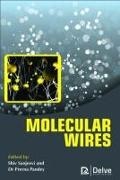Ulteriori informazioni
Molecular wires are chains of molecules that conduct electric current. These molecules can include natural species like DNA or encompass a range of polymeric organic or inorganic molecules.Recent research has suggested that these molecular wires conduct current at a better rate than that of semiconductors. The potential of self-assembly can be used to assemble several molecules to carry out specific functions. Molecular wires have shown to enhance certain properties of polymers for use in potentiometry. Research suggests the use of nanowires to measure torque at Nano levels. It is proposed that these molecular wires may serve to overcome the limitations associated with the current semi-conductors or macroscopic wires.In 1959, physicist Richard Feynman discussed the possibilities of devices of small dimensions in his lecture entitled ''There's plenty of room at the bottom"-this book compiles various aspects of this field that hopes to pique the potential researcher into exploring this exciting arena.The book serves to cover various aspects of molecular wires like its brief history, research carried out, the potential working, various concepts involving the working and construction and potential applications of these molecular wires.
Info autore
Shiv Sanjeevi completed his BSc in Biotechnology from Mumbai University and secured second rank in Mumbai University and first rank in his college: Kishinchand chellaram College. Shiv secured first rank in his college KET's V.G.Vaze College and has worked on a stem cell project at the Specialized Centre for Cell Based Therapy (SCCT), KEM Hospital at Mumbai, following which he was a Junior Research Fellow at Microbiology & Cell Biology Department, Indian Institute of Science, Bangalore from August 2009 to November 2011. The field of work involved cloning of cell wall genes and transcription factors in E. coli & M. smegmatis. This was followed by a stint as a Research and Development Executive at Transasia Biomedicals, Mumbai where he worked on patent writing and developing immunoassays from 2011 till 2013. In 2013, he entered the teaching field where he has been tutoring biology and chemistry to the students of 11th and 12th grades along with English grammar and communication skills to people of all age groups.
Dr Prerna Pandey, a biotechnologist with several years of wet lab research experience, worked at International Center for Genetic Engineering and Biotechnology, New Delhi. She has also worked at Transasia Biomedicals and Advance Enzyme Technologies as a scientist. Prerna has published papers in peer-reviewed journals, and has submitted a number of annotated Geminiviral genome sequences in the GenBank, including two novel ones. Now, she works as a freelance scientific editor and writer.
Riassunto
Focuses on research and development in the measurement, synthesis, assembly and manipulation of molecular wires and nanostructures. Bringing together experiment and theory to enable applications in real-life devices, this handbook and ready reference provides essential information on how to control and direct charge transport.

